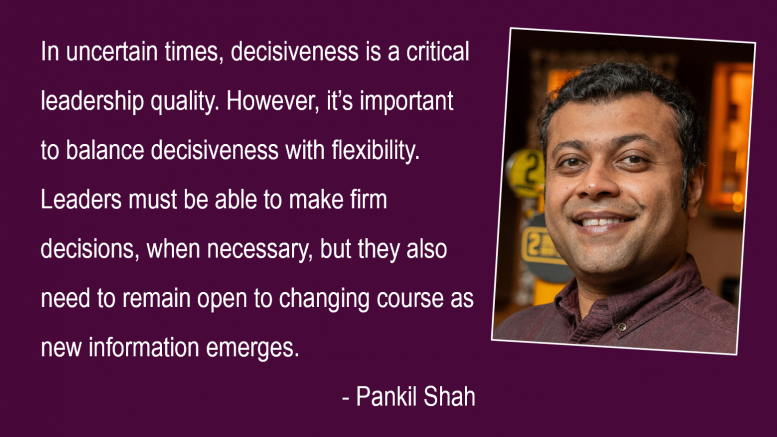In today’s rapidly changing world, uncertainty has become a constant. Whether it’s economic shifts, technological advancements, or global events, leaders are increasingly faced with situations where the path forward is unclear. In such times, the ability to make strategic decisions with clarity and purpose is more crucial than ever. Successful leaders navigate these challenges not by waiting for certainty but by embracing uncertainty and making informed, deliberate choices. Here’s how to lead effectively in uncertain times.
The first step in leading with clarity and purpose during uncertain times is to reframe uncertainty as an opportunity rather than a threat. Uncertain times often bring about new challenges and unexpected changes, but they also offer a chance to innovate and rethink traditional strategies. Leaders who embrace this mindset are better positioned to identify opportunities that others might miss. This proactive approach allows them to stay ahead of the curve, turning potential setbacks into growth opportunities.
In uncertain times, data can be both a guiding light and a source of confusion. Leaders must strike a balance between relying on data and avoiding paralysis by analysis. It’s essential to gather relevant information and insights, but equally important is the ability to make decisions without having all the data. This often requires trusting your instincts, relying on your experience, and being comfortable with taking calculated risks. The key is to use data to inform your decisions, not to dictate them.
Clarity of vision is vital when navigating uncertainty. A well-defined vision provides a sense of direction and purpose, which is crucial for both leaders and their teams. When the external environment is unpredictable, a strong internal compass helps maintain focus on long-term goals. Leaders should communicate this vision consistently, ensuring that every team member understands the broader objectives and how their role contributes to achieving them. This alignment fosters a sense of purpose and helps the team stay motivated even in challenging times.
In uncertain times, decisiveness is a critical leadership quality. However, it’s important to balance decisiveness with flexibility. Leaders must be able to make firm decisions when necessary, but they also need to remain open to changing course as new information emerges. This adaptability is key to navigating uncertainty successfully. Being too rigid can lead to missed opportunities or exacerbate problems while being too indecisive can cause confusion and erode trust. The best leaders are those who can commit to a course of action while remaining agile enough to pivot when circumstances change.
Resilience is the ability to bounce back from setbacks and continue moving forward. In times of uncertainty, resilience becomes an essential trait for both leaders and their teams. Leaders can cultivate resilience by fostering a positive mindset, encouraging a culture of learning from failure, and providing the support their team needs to stay motivated. By demonstrating resilience in their actions, leaders set an example for their team, showing that challenges can be overcome and that setbacks are a natural part of the journey toward success.
Effective communication is always important, but it becomes even more critical in uncertain times. Leaders must ensure that their teams are informed, engaged, and aligned with the organisation’s goals. Transparent communication builds trust, reduces anxiety, and empowers team members to contribute to the decision-making process. Leaders should create an open environment where questions and concerns can be raised without fear, allowing for a more collaborative approach to navigating uncertainty.
In uncertain times, the pressure to achieve results can lead to ethical compromises. However, true leadership requires maintaining integrity and upholding ethical standards, even when the stakes are high. Ethical leadership builds long-term trust and credibility, both within the organisation and with external stakeholders. By prioritising ethics, leaders not only protect their organisation’s reputation but also create a culture where doing the right thing is always the norm.
The views and opinions published here belong to the author and do not necessarily reflect the views and opinions of the publisher.



Be the first to comment on "Strategic Decision-Making: How to Lead with Clarity and Purpose in Uncertain Times"